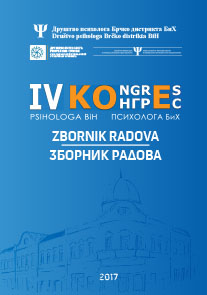Ispitivanje povezanosti stadija religioznog razvoja i stavova o rastavi braka
Study on Correlation of Religious Development Stages and Attitudes about Divorce
Author(s): Ankica BakovićSubject(s): Education, Comparative Studies of Religion, Developmental Psychology, Personality Psychology, Social Theory, Family and social welfare, Welfare services, Sociology of Religion
Published by: Logotip
Keywords: religiosity; the quality of married life; divorce;
Summary/Abstract: The aim was to check the relationship between stages of religious development and attitudes about divorce and the quality of married life among fiancés. The study included 71 respondents of both genders from the area of Livno, Bosnia and Herzegovina. None of them had ever been married (34 women and 37 men, M = 23.5, sd = 2.99). For measuring the stages of religious development, there was used multidimensional Fowler scale of religious attitudes, which measures four stages in the development of faith (2nd, 3rd, 4th and 5th) that go from lower to higher. The paper take into account the results of previous research on the basis of which are formulated initial assumptions about the perception of the most common causes of divorce, attitudes regarding the phenomenon of divorce in general, and the insufficient influence of religious consciousness in attitudes toward divorce. Pearson correlation coefficientwas used for the processing of the results. As expected, results indicate a significant connection between the claims of the high value of marriage with higher stages of religious development in respondents. There was no statistically significant negative correlation between the stages of religious development and claim that divorce is something completely normal. Subjects who achieved better results at lower stages of religious development (2 and 3) considered lack of communication between spouses as the most common cause of divorce, and subjects with higher scores on the higher stages (4 and 5) as reasons for divorce cited too late entering into a marriage, the lack of genuine faith and spiritual life, the problem of addiction, the emancipation of women, and the too high expectations from marriage. Common to all respondentsis that they believe the disagreement of spouses in the area of sexuality and lack of willingness to sacrifice is also among the more often reasons for divorce. Based on the results, it is clearly shown that initial assumptions about the attitudes of respondents toward the divorce are independent of the stage of religious development.Also, there is gained insight about the most common causes of divorce, which can be useful to marriage advisors. However, further research should be carried out on the larger and the more age heterogeneous sample.
Journal: Zbornik radova Kongresa psihologa Bosne i Hercegovine
- Issue Year: 2017
- Issue No: 4
- Page Range: 279-298
- Page Count: 20
- Language: Croatian

